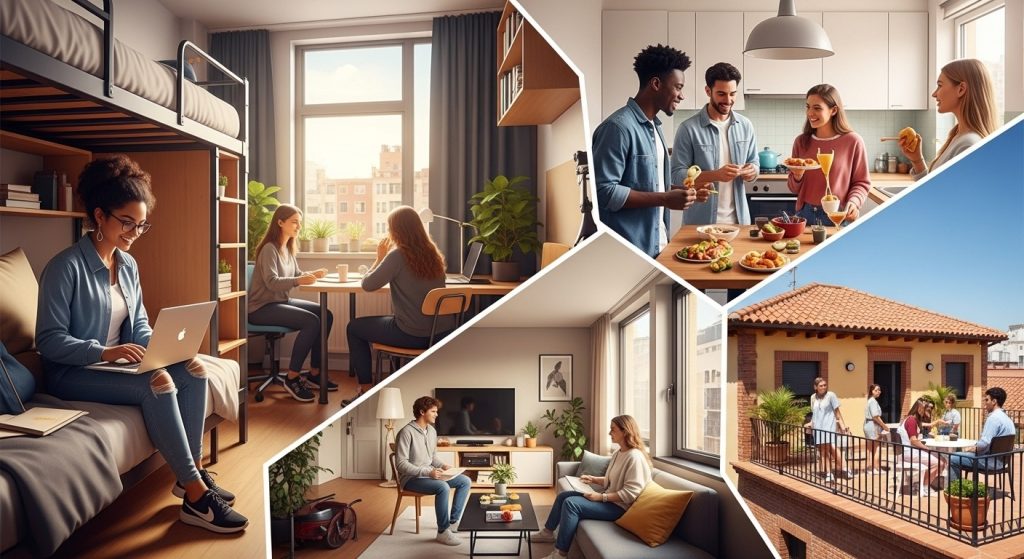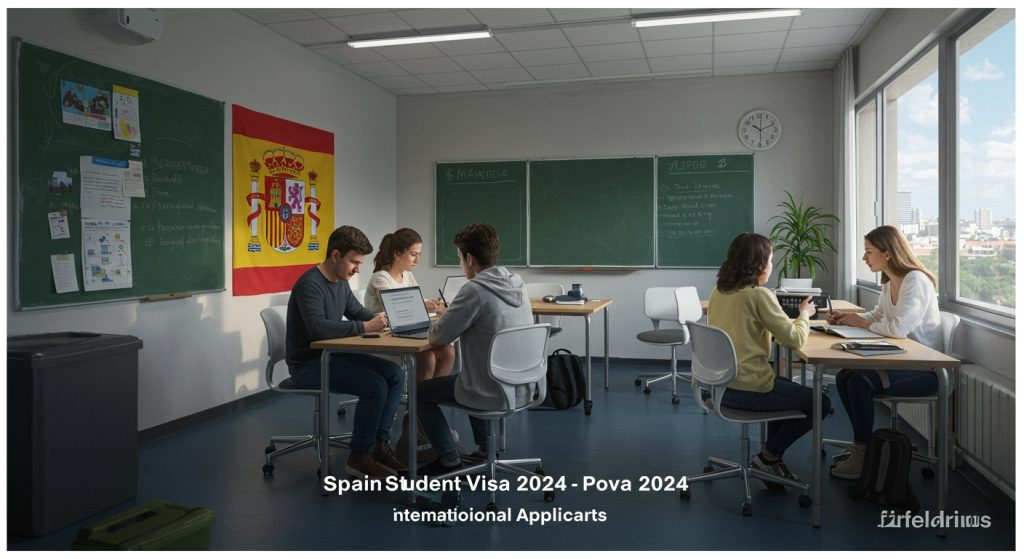text
Imagine landing in sunny Spain, ready to embrace university life. Facing the daunting task of securing accommodation. Beyond the allure of tapas and siestas, finding the right student housing is crucial for academic success and cultural immersion. Forget generic dorm rooms; today’s Spanish student accommodation landscape is evolving. Purpose-built student accommodation (PBSA) is booming, offering modern amenities like co-working spaces and gyms, particularly in cities like Madrid and Barcelona. But, competition is fierce. Early application is key. Sharing a “piso” (apartment) with local or international students remains a popular, budget-friendly option, fostering language skills and friendships. But navigating rental contracts and guarantor requirements can be tricky. Understanding these nuances, from securing a “certificado digital” for online applications to exploring regional housing portals, will dramatically improve your chances of finding your ideal Spanish university home.

Understanding Your Accommodation Options in Spain
Navigating the Spanish student accommodation landscape can feel overwhelming at first. Understanding the available options is the crucial first step. Here’s a breakdown of the most common choices for students pursuing their studies at a University in Spain:
- Colegios Mayores (Student Halls): These are traditional university residences, often affiliated with the university itself. They typically offer full-board (meals included), social activities. A structured environment. Think of them as a more comprehensive, community-focused living experience.
- Residencias de Estudiantes (Student Residences): Similar to Colegios Mayores but often privately owned. They may offer a wider range of facilities and services. The level of supervision can vary. Some offer full-board, while others provide self-catering options.
- Pisos Compartidos (Shared Apartments): This is perhaps the most popular option, especially for international students. You’ll share an apartment with other students, each having their own bedroom and sharing common areas like the kitchen, living room. Bathrooms. This offers greater independence and is usually the most budget-friendly choice.
- Estudios (Studio Apartments): These are self-contained apartments designed for single occupancy. They provide complete privacy and independence but are generally more expensive than shared apartments.
- Homestays: Living with a Spanish family can be an excellent way to immerse yourself in the culture and improve your language skills. Homestays often include meals and provide a supportive environment.
Colegios Mayores vs. Residencias: A Closer Look
While both Colegios Mayores and Residencias offer student accommodation, there are key differences to consider:
| Feature | Colegios Mayores | Residencias de Estudiantes |
|---|---|---|
| Affiliation | Often affiliated with the university | Typically privately owned |
| Structure | More structured environment with established rules and traditions | More flexible, varying levels of supervision |
| Social Activities | Emphasis on social events, cultural activities. Community building | Social activities may vary depending on the residence |
| Catering | Usually full-board (meals included) | May offer full-board, half-board, or self-catering options |
| Cost | Generally more expensive than residencias due to comprehensive services | Cost varies depending on the location, facilities. Services |
Finding the Perfect Piso Compartido: Tips and Tricks
Securing a shared apartment requires careful planning and research. Here’s a practical guide to help you find your ideal “piso”:
- Start your search early: The demand for student accommodation in popular university cities is high, so start looking several months before your arrival.
- Utilize online platforms: Websites like Idealista, Pisos. Com. Spotahome are popular for finding shared apartments in Spain. Erasmusu and Badi are also great resources specifically for international students.
- Join student groups on social media: Facebook groups dedicated to students in your university city can be a valuable source of details and apartment listings.
- Consider the location: Choose a location that is convenient for your university campus and other essential amenities like supermarkets, public transport. Leisure facilities.
- Set a budget: Determine how much you can afford to spend on rent and utilities each month. Remember to factor in costs like internet, gas, electricity. Water.
- Meet your potential roommates: It’s crucial to meet your potential roommates before committing to an apartment. This will give you a sense of their personalities and living habits.
- Read the lease agreement carefully: Before signing any lease agreement, make sure you grasp all the terms and conditions, including the deposit amount, payment schedule. Termination clause.
- Don’t send money without verification: Be wary of online scams and never send money to anyone without verifying their identity and the legitimacy of the apartment listing.
Navigating the Legal Aspects of Renting in Spain
Understanding the legal framework surrounding renting in Spain is essential for protecting your rights as a tenant.
- The Lease Agreement (Contrato de Alquiler): This is a legally binding document that outlines the terms and conditions of your tenancy. It should include details like the rent amount, payment schedule, deposit amount, duration of the lease. Responsibilities of both the landlord and the tenant.
- The Deposit (Fianza): Landlords typically require a deposit equivalent to one or two months’ rent. This deposit is held as security against any damage to the property or unpaid rent. The landlord is legally obligated to return the deposit to you at the end of the tenancy, provided that the property is in good condition and all rent payments are up to date.
- Your Rights as a Tenant: As a tenant in Spain, you have certain rights, including the right to a habitable property, the right to privacy. The right to receive proper notice before the landlord enters the property.
- Seeking Legal Advice: If you encounter any problems with your landlord or have any questions about your rights, it’s advisable to seek legal advice from a qualified lawyer specializing in tenancy law.
Essential Spanish Vocabulary for Apartment Hunting
Knowing some basic Spanish vocabulary will greatly assist you in your search for accommodation in a University in Spain. Here are some key terms to learn:
- Piso: Apartment
- Habitación: Room
- Alquiler: Rent
- Fianza: Deposit
- Contrato: Contract
- Propietario/a: Landlord/Landlady
- Compañero/a de piso: Roommate
- Amueblado/a: Furnished
- Sin amueblar: Unfurnished
- Gastos: Utilities
Personal Anecdote: My Experience Finding Accommodation in Madrid
When I first moved to Madrid to study at Universidad Complutense, finding accommodation was a major challenge. I started my search online, using websites like Idealista and Erasmusu. I quickly realized that many of the listings were outdated or inaccurate. I also joined several Facebook groups for international students in Madrid, which proved to be a valuable resource. After several weeks of searching and attending numerous apartment viewings, I finally found a shared apartment in the vibrant neighborhood of Malasaña. The apartment was centrally located, close to my university campus. Within my budget. My roommates were also international students, which made it easier to adjust to living in a new country. One of the biggest challenges I faced was understanding the lease agreement, which was written in Spanish. I had to ask a friend who was fluent in Spanish to help me translate the document and ensure that I understood all the terms and conditions. My experience taught me the importance of starting your accommodation search early, utilizing multiple resources. Seeking help when needed. It also highlighted the value of connecting with other international students who can offer support and guidance.
Real-World Applications: How Universities in Spain Support Students
Many universities in Spain offer support services to help international students find accommodation. These services may include:
- Accommodation Offices: Some universities have dedicated accommodation offices that provide details on available options, assist with finding apartments. Offer advice on tenancy agreements.
- Partnerships with Student Residences: Universities often partner with student residences to provide guaranteed accommodation for international students.
- Online Forums and Platforms: Universities may have online forums or platforms where students can connect with each other and share data about available accommodation.
- Orientation Programs: Orientation programs for international students often include sessions on finding accommodation and navigating the Spanish rental market.
Conclusion
Finding your ideal student accommodation in Spain requires proactive planning and a bit of local savvy. Remember that popular cities like Madrid and Barcelona are experiencing increased demand, pushing students toward smaller. Equally vibrant, university towns like Salamanca or Granada. Don’t solely rely on university resources; explore online platforms and connect with student communities on social media for insider tips. From personal experience, visiting potential accommodations, even virtually, can make all the difference. Pay close attention to the contract terms, especially regarding deposit returns and early departure clauses – a legal consultation might be beneficial. Ultimately, your accommodation is more than just a place to sleep; it’s the foundation for your Spanish adventure. Choose wisely, embrace the process. Prepare to create unforgettable memories in your new home. Your ideal university home is waiting! For more info, check out platforms like Spotahome.
More Articles
Beyond the Classroom: Thriving in Student Life at Top Engineering Schools
Securing Engineering Scholarships: A Guide for International Students Success
Unlocking Data Science: University Research Opportunities For Ambitious Students
Career Change: Best Data Science Programs To Boost Your Earning Potential
FAQs
Okay, so where do most international students even live in Spain?
Good question! It really depends on the city and your budget. Residencia universitaria (university halls of residence) are a classic. Private student residences are also popping up everywhere. Then there’s the option of sharing a flat (‘piso compartido’) with other students, which is often the most budget-friendly.
What are ‘residencias’ actually like?
Think dorms. With a Spanish twist. They can range from basic to pretty swanky, often offering meals, cleaning services. Social activities. They’re a great way to meet people quickly. Might be less independent than other options. Check the rules and curfew policies though, as they can vary a lot.
What’s the deal with finding a flatshare? Seems a bit daunting.
It can be! Online platforms are your friend – Idealista, Pisos. Com. Spotahome are popular. Facebook groups for Erasmus or international students in your city are also goldmines. Be prepared to compete, especially in big cities like Madrid or Barcelona. And always, always view the place in person (or have someone you trust do it) before handing over any money.
How far in advance should I start looking for accommodation?
The earlier, the better, seriously! Aim to start your search at least 2-3 months before you arrive, even earlier if you’re going to a really popular student city. Places get snapped up fast!
Deposit? What kind of money am I looking at upfront?
Expect to pay a deposit (usually one or two months’ rent) and potentially the first month’s rent upfront. Some landlords might also ask for a guarantor (‘aval’), which can be tricky if you don’t have family in Spain. Don’t be afraid to negotiate. Be realistic.
Any tips for avoiding scams? I’ve heard some horror stories…
Sadly, they exist. If it seems too good to be true, it probably is. Never send money without seeing the place or speaking to the landlord/current tenants. Use trusted websites and be wary of landlords who pressure you to pay quickly or ask for unusual payment methods. Trust your gut!
What should I expect to pay for student accommodation in Spain?
This varies wildly depending on the city, the type of accommodation. The location. Expect to pay more in Madrid and Barcelona than in smaller cities like Seville or Valencia. A room in a shared flat could cost anywhere from €250 to €600+ per month, while a residencia might be €500 to €1000+, depending on the services included.



